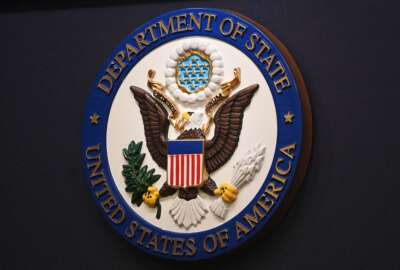VA awarded bonuses to career executives amidst a multi-billion dollar budget shortfall
Now the top Republicans on the House and Senate VA committees are calling on the department to hold its executives accountable for these issues.
- The Department of Veterans Affairs is dealing with a multi-billion-dollar budget shortfall and awarded bonuses to career executives not eligible to receive them last year. Now the top Republicans on the House and Senate VA committees are calling on the department to hold its executives accountable for these issues during their annual reviews. House committee Chairman Mike Bost (R-Ill.) and Senate committee Ranking Member Jerry Moran (R-Kan.) say department leaders should consider the role VA executives had in these management issues before making any performance-based compensation decisions. (VA committee leaders call for VA executive accountability after budget mismanagement - House VA Committee )
- House Republicans are seeking information from agencies on their relationships with federal unions. In a series of 24 letters to agency officials, the GOP-led Oversight committee pressed for details on how labor policies are affecting federal operations. The lawmakers are particularly focusing on telework agreements between agencies and unions. The issue has gained attention since reports of the Social Security Administration reaching a new telework agreement with the American Federation of Government Employees. The committee lawmakers are asking agencies for details on their ongoing union negotiations, and in-person work rates of federal employees.(Letters to 24 agencies on new labor deals - House Oversight and Accountability Committee)
- After growing pressure, efforts to repeal the Windfall Elimination Provision and Government Pension Offset are gaining traction in the Senate. During a labor rally Wednesday morning, Senate Majority Leader Chuck Schumer committed to a floor vote on the Social Security Fairness Act. The bill would eliminate WEP and GPO, provisions that reduce or eliminate Social Security benefits for some federal retirees and other public servants such as teachers and firefighters. Schumer’s promise for Senate action comes after the House cleared the bill in a vote of 327 to 75 last month. There’s no indication of how quickly the bill might get taken up in the Senate, but just a few weeks remain to vote on the Social Security Fairness Act before the end of the 118th Congress.(At labor rally, Schumer commits to Senate vote on Social Security Fairness Act - Federal News Network)
- House Republicans are calling on President-elect Donald Trump to pull the plug on IRS Direct File. The IRS tested its free online tax filing platform with taxpayers in a dozen states as part of a pilot this year. The agency planned to expand to 24 states next year as a permanent program. But nearly 30 GOP lawmakers are calling on Trump and the heads of his Department of Government Efficiency to kill the program in an executive order on his first day in office. The lawmakers say they don’t support the IRS using its funding to support Direct File when there are other ways for taxpayers to file online.(Smith, Edwards, colleagues call for day-one elimination of IRS Direct File - Rep. Adrian Smith)
- The General Services Administration is trying for a third time to bridge the so-called “valley of death” for vendors in the Small Business Innovation Research and Small Business Technology Transfer programs. In GSA’s latest request for information, the agency is asking current SBIR and STTR participants for details about themselves and what products or services they provide. GSA hopes to use this RFI to develop its latest contract vehicle: Innovation in Phase 3. IP3 will be a multiple award contract for any vendor who has won a SBIR or STTR award with the goal of making it easier for agencies to find and buy these products or services. Responses to the RFI are due by December 17.
- An industry group makes recommendations to advance the White House’s cyber office. The incoming Trump administration should boost the authorities and increase staff details at the White House Office of the National Cyber Director. That’s according to the Cybersecurity Coalition, an industry group led by former cyber officials. In a new white paper, the group says the National Cyber Director should be codified as the U.S. government’s lead external-facing cyber official. And the group recommends staffing ONCD with more agency detailees and subject matter experts from within the government. (An updated vision for the Office of the National Cyber Director - Source: Cybersecurity Coalition )
- House lawmakers have passed two bills that would require agencies to focus more on threats from China. The first bill, the “Strengthening Cyber Resilience Against State-Sponsored Threats Act,” would create an interagency task force led by the Cybersecurity and Infrastructure Security Agency and the FBI. The task force would specifically focus on China-backed cyber threats to U.S. critical infrastructure. And the House also passed a separate bill that would require the Department of Homeland Security to set up a working group on countering nontraditional espionage threats from China. (“Strengthening Cyber Resilience Against State-Sponsored Threats Act” - Congress.gov )
- The 2025 defense policy bill cleared the House on Wednesday night and is now heading to the Senate for approval. A controversial provision to ban gender-affirming care for children of service members, which sparked opposition from Democrats, made it into the bill. One hundred twenty-four Democrats and 16 Republicans voted against the bill. If passed, the legislation would give a 4.5% pay raise to all service members and an extra 10% pay bump to junior enlisted troops. The bill must be signed by President Joe Biden to become law.(Annual defense policy bill clears the House, heads to the Senate - House Armed Services Committee)
- The Pentagon is sunsetting Task Force Lima and establishing the Artificial Intelligence Rapid Capabilities Cell. The new AI rapid capabilities cell is tasked with accelerating the adoption and deployment of AI tools across the department. The Pentagon is allocating $100 million in fiscal 2024 and 2025 to support some of the cell’s initial projects. About $35 million will go toward four frontier AI pilot programs. Radha Plumb, the department’s chief digital and artificial intelligence officer, said the projects will launch immediately. Another $40 million will be awarded to non-traditional and small businesses in Small Business Innovation Research contracts. Plumb said the awards will be made mid-January.(DoD sunsets Task Force Lima, launches AI rapid capabilities cell - Federal News Network)
- The Army is giving vendors more insights into how it wants to create its next generation command and control program. It release an updated characteristics of need document on Monday. The Army put out the first version of the characteristics of need in May. This new document includes several new details that are important for the Army’s development of the NGC2 programmatic requirements. The new sections include a more specific breakdown of the technology stack that will underlie NGC2. It also addresses mission partner interoperability requirements and how to incorporate artificial intelligence and machine learning services into the program. (Army updates NGC2 characteristics of need - SAM.gov)
Copyright © 2025 Federal News Network. All rights reserved. This website is not intended for users located within the European Economic Area.
Michele Sandiford
Michele Sandiford is a digital editor at Federal News Network.






